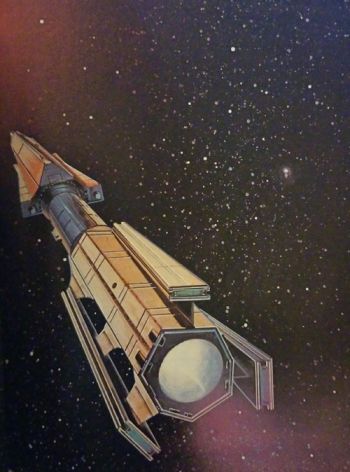Difference between revisions of "Verne class (FASA)"
| Line 62: | Line 62: | ||
|- | |- | ||
|class="HeaderRow ButtonLeft" style="width:25%;text-align:right;vertical-align:top;"|Velocity (Cruising) | |class="HeaderRow ButtonLeft" style="width:25%;text-align:right;vertical-align:top;"|Velocity (Cruising) | ||
| − | |style="vertical-align:top;"|Warp | + | |style="vertical-align:top;"|Warp 1.5<!-- (15.6[[speed of light|c]])--><ref group="Notes" name="WarpSpeeds"/> |
|- | |- | ||
|class="HeaderRow ButtonLeft" style="width:25%;text-align:right;vertical-align:top;"|Velocity (Maximum) | |class="HeaderRow ButtonLeft" style="width:25%;text-align:right;vertical-align:top;"|Velocity (Maximum) | ||
| − | |style="vertical-align:top;"|Warp | + | |style="vertical-align:top;"|Warp 1.7<!-- (19.7[[speed of light|c]])--> |
|- | |- | ||
|class="HeaderRow ButtonLeft" style="width:25%;text-align:right;vertical-align:top;"|Typical Voyage Duration | |class="HeaderRow ButtonLeft" style="width:25%;text-align:right;vertical-align:top;"|Typical Voyage Duration | ||
| Line 73: | Line 73: | ||
|} | |} | ||
</div> | </div> | ||
| + | |||
| + | <div style="clear:both;"></div> | ||
| + | ===Notes=== | ||
| + | <references group="Notes"> | ||
| + | <ref name="WarpSpeeds">Although [[Star Trek: Spaceflight Chronology (Book)|''Star Trek: Spaceflight Chronology'']] established that the ''Verne'' class was capable of speeds in excess of Warp 2, this is explicitly contradicted in the ''[[Star Trek: Enterprise|Enterprise]]'' episode "[[First Flight (Episode)|First Flight]]," in which [[Earth Starfleet Ranks#Commander|Commanders]] [[Archer, Jonathan|Jonathan Archer]] and [[Robinson, A.G.|A.G. Robinson]] are the first [[Humans]] to break the Warp 2 barrier in [[Chronology: 2140|2140]]. The speeds of the ''Verne'' class have been adjusted to reflect this.</ref> | ||
| + | </references> | ||
<div style="clear:both;"></div> | <div style="clear:both;"></div> | ||
Revision as of 05:35, 30 April 2019

Rapid improvements in warp drive technology resulted in the launch of the advanced Verne class cruiser in 2078, which boasted a crew complement of 112. It was noteworthy as the first warp-capable class equipped with launch tubes and thermonuclear hydrogen-fusion torpedoes. The class also featured separated multi-drive warp engines, which used a 35:1 intermix ratio and provided for a much more efficient warp drive. The class would see 120 built, and would remain in service until 2140.[1][2]
Verne class vessels
Specifications
| Length | 236m |
| Beam | 80.4m |
| Draught | 50m |
| Mass | 25 million kg |
| Ship's Complement |
|
| Navigation | Warp Celestial Guidance |
| Communications | Particle Subcarrier Radiotelemetry |
| Computer | Independent Thought Memory Scan |
| Weapons |
|
| Gravity | .5-1.0g |
| Atmosphere | 24% O2; 11% humidity |
| Sustenance Duration | 5.3 years at Standard Ship's Complement |
Performance
| Range (Standard) | 35 light years |
| Range (Maximum) | 50 light years |
| Velocity (Cruising) | Warp 1.5[Notes 1] |
| Velocity (Maximum) | Warp 1.7 |
| Typical Voyage Duration |
|
Notes
- ↑ Although Star Trek: Spaceflight Chronology established that the Verne class was capable of speeds in excess of Warp 2, this is explicitly contradicted in the Enterprise episode "First Flight," in which Commanders Jonathan Archer and A.G. Robinson are the first Humans to break the Warp 2 barrier in 2140. The speeds of the Verne class have been adjusted to reflect this.
FASA Timeline

Rapid improvements in warp drive technology resulted in the launch of the advanced Verne class cruiser in 2064, which boasted a crew complement of 112. It was noteworthy as the first warp-capable class equipped with launch tubes and thermonuclear hydrogen-fusion torpedoes. The class also featured separated multi-drive warp engines, which used a 35:1 intermix ratio and provided for a much more efficient warp drive. The class would see 120 built, and would remain in service until 2095.[1][2]
Verne class vessels
Specifications
| Length | 236m |
| Beam | 80.4m |
| Draught | 50m |
| Mass | 25 million kg |
| Ship's Complement |
|
| Navigation | Warp Celestial Guidance |
| Communications | Particle Subcarrier Radiotelemetry |
| Computer | Independent Thought Memory Scan |
| Weapons |
|
| Gravity | .5-1.0g |
| Atmosphere | 24% O2; 11% humidity |
| Sustenance Duration | 5.3 years at Standard Ship's Complement |
Performance
| Range (Standard) | 35 light years |
| Range (Maximum) | 50 light years |
| Velocity (Cruising) | Warp 2.5 (15.6c) |
| Velocity (Maximum) | Warp 2.7 (19.7c) |
| Typical Voyage Duration |
|
References
- ↑ 1.0 1.1 Goldstein, Stan and Goldstein, Fred with Sternbach, Rick. Star Trek: Spaceflight Chronology. Pocket Books, 1980.
- ↑ 2.0 2.1 Theisen, John A.. "The Romulan War." Star Trek: The Role Playing Game, Supplement 2221A. FASA Corporation. 1986.